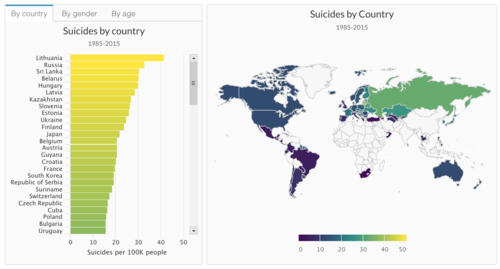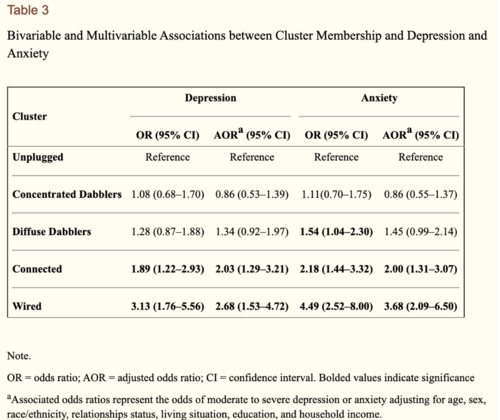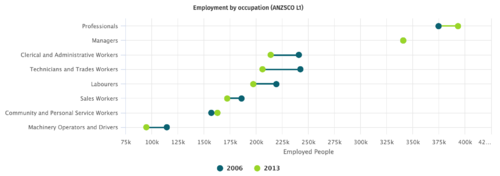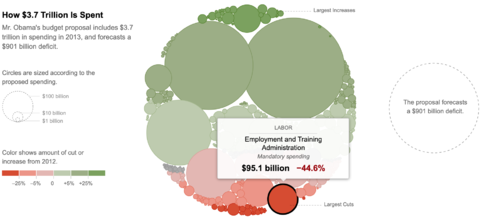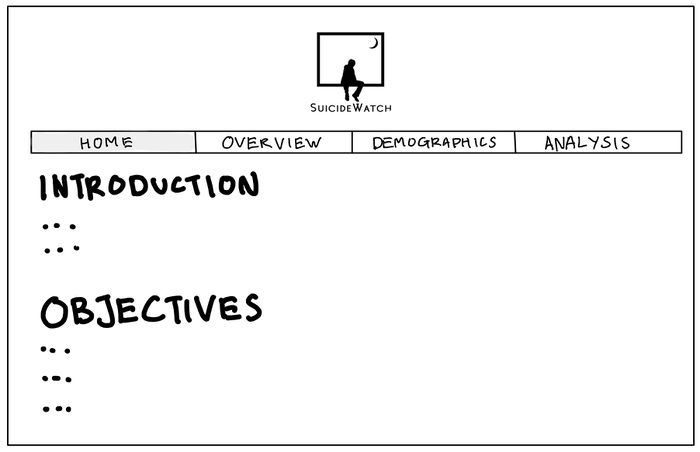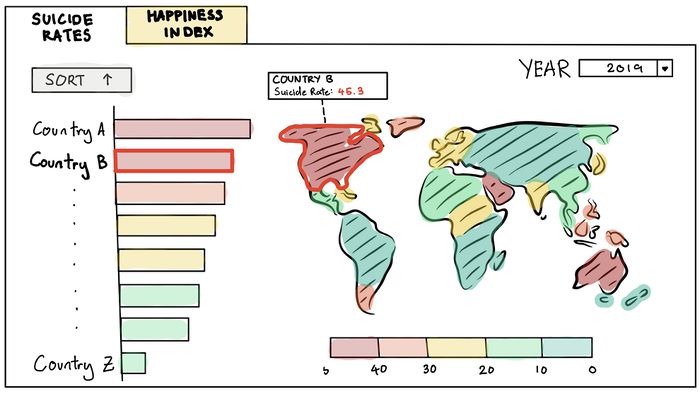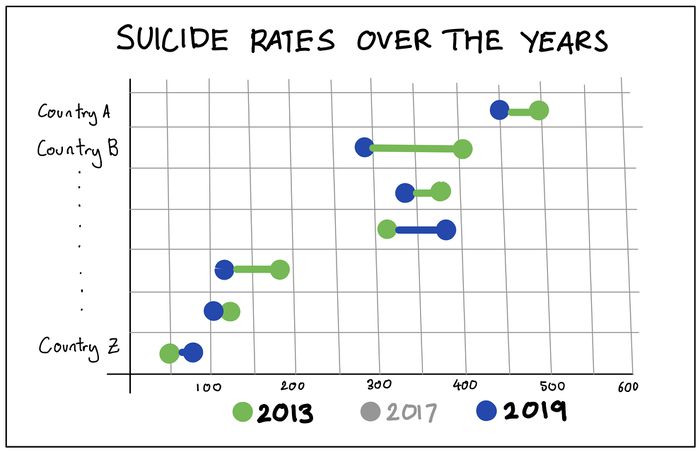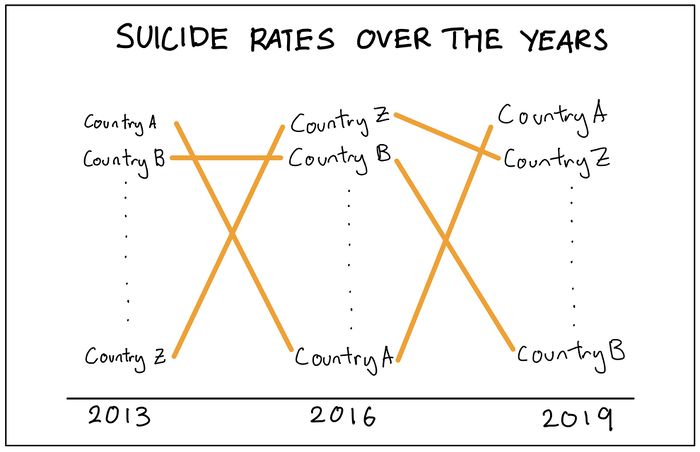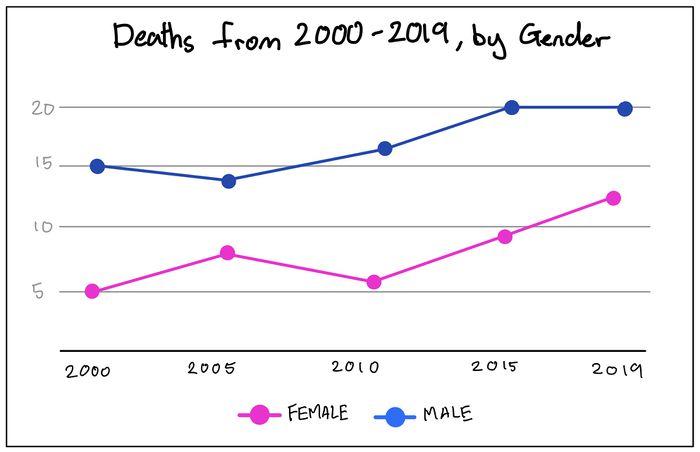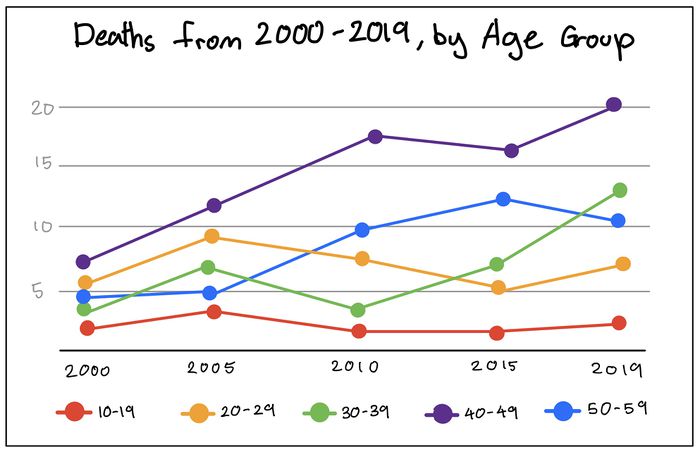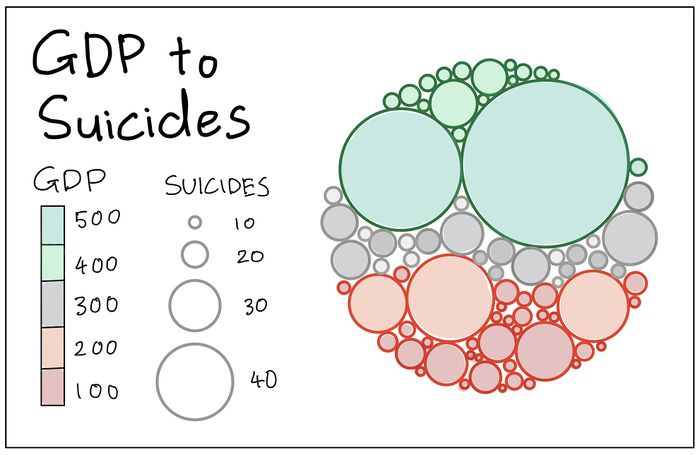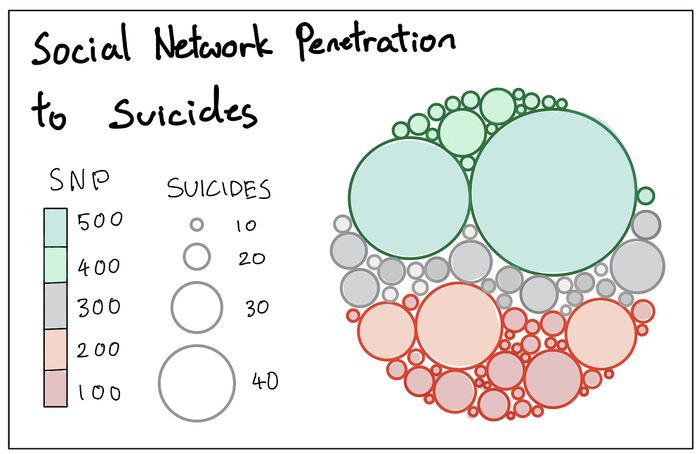Difference between revisions of "SuicideWatch: Proposal"
| (12 intermediate revisions by 2 users not shown) | |||
| Line 150: | Line 150: | ||
|- | |- | ||
| | | | ||
| − | <p><center>''' | + | <p><center>'''The New Zealand Labour Market Dashboard''' </center></p> |
| − | [[File: | + | [[File:Two-point-line-graph.png|500px|center]] |
| − | <p><center>'''Source''': | + | <p><center>'''Source''': https://mbienz.shinyapps.io/labour-market-dashboard_prod/</center></p> |
|| | || | ||
| − | * This | + | '''Pros:''' <br> |
| + | *This chart is suitable for showing figure change between two timestamps <br> | ||
| + | *It is clear and easy to understand <br> | ||
| + | '''Cons:''' <br> | ||
| + | *The value fluctuation within the duration is excluded from the graph <br> | ||
|- | |- | ||
| | | | ||
| − | <p><center>''' | + | <p><center>'''Bubble Chart - Obama’s 2013 Budget Proposal''' </center></p> |
| − | [[File: | + | [[File:Bubble-chart.png|500px|center]] |
| − | <p><center>'''Source''': | + | <p><center>'''Source''': https://archive.nytimes.com/www.nytimes.com/interactive/2012/02/13/us/politics/2013-budget-proposal-graphic.html</center></p> |
|| | || | ||
| − | * This | + | '''Pros:''' <br> |
| + | *This chart is eye-appealing for two-dimension analysis <br> | ||
| + | *Extreme data points can be easily identified | ||
| + | '''Cons:''' <br> | ||
| + | *Comparison for similar values is hard to be done, as no axis is given and all figures are displayed in color or size <br> | ||
|} | |} | ||
<br/> | <br/> | ||
| Line 167: | Line 175: | ||
<!-- Proposed Storyboard --> | <!-- Proposed Storyboard --> | ||
| + | |||
==<div style="background: #364558; padding: 15px; font-weight: bold; line-height: 0.3em; text-indent: 0px;font-size:20px"><font face="Arial" color=#fbfcfd>PROPOSED STORYBOARD</font></div>== | ==<div style="background: #364558; padding: 15px; font-weight: bold; line-height: 0.3em; text-indent: 0px;font-size:20px"><font face="Arial" color=#fbfcfd>PROPOSED STORYBOARD</font></div>== | ||
| Line 186: | Line 195: | ||
=== OVERVIEW === | === OVERVIEW === | ||
| − | + | This page will provide the viewer with an overview of global suicide rates and overall happiness scores. | |
<!-- Table --> | <!-- Table --> | ||
{| class="wikitable" style="background-color:#FFFFFF;" width="100%" | {| class="wikitable" style="background-color:#FFFFFF;" width="100%" | ||
| Line 194: | Line 203: | ||
|- | |- | ||
| | | | ||
| − | <p><center>''' | + | <p><center>'''Bar and Choropleth Map''' </center></p> |
| − | [[File: | + | [[File:SuicideWatch_v1_overview1.jpg|700px|center]] |
| + | || | ||
| + | * Allows visualization of Worldwide Suicide Rate/Happiness Index Scores by year, sorted in ascending/descending order. | ||
| + | * Color of the bars and map will correspond to the Suicide Rate/Happiness Index Score of each country. This makes it easy to identify clusters or regions where suicide rates or happiness index scores tend to be high or low. | ||
| + | |- | ||
| + | | | ||
| + | <p><center>'''Connected Dot Plot''' </center></p> | ||
| + | [[File:SuicideWatch_v1_overview2.jpg|700px|center]] | ||
|| | || | ||
| − | * | + | * Summarises suicide rate/happiness index score changes across selected years |
|- | |- | ||
| | | | ||
| − | <p><center>''' | + | <p><center>'''Slope Graph''' </center></p> |
| − | [[File: | + | [[File:SuicideWatch_v1_overview3.jpg|700px|center]] |
|| | || | ||
| − | * | + | * Compares suicide rate and happiness index rankings of each country over the years. |
|} | |} | ||
<br/> | <br/> | ||
=== DEMOGRAPHICS === | === DEMOGRAPHICS === | ||
| − | |||
<!-- Table --> | <!-- Table --> | ||
{| class="wikitable" style="background-color:#FFFFFF;" width="100%" | {| class="wikitable" style="background-color:#FFFFFF;" width="100%" | ||
| Line 216: | Line 231: | ||
|- | |- | ||
| | | | ||
| − | <p><center>''' | + | <p><center>'''Line Graph''' </center></p> |
| − | [[File: | + | [[File:SuicideWatch_v1_demographic1.jpg|700px|center]] |
| − | + | [[File:SuicideWatch_v1_demographic2.jpg|700px|center]] | |
| − | |||
| − | |||
| − | |||
| − | |||
| − | [[File: | ||
|| | || | ||
| − | * | + | * Breakdown of Suicides by Gender/Age |
|} | |} | ||
<br/> | <br/> | ||
=== SOCIOECONOMIC ANALYSIS === | === SOCIOECONOMIC ANALYSIS === | ||
| − | + | This page explores possible relationships between socioeconomic factors and suicide rates. | |
<!-- Table --> | <!-- Table --> | ||
{| class="wikitable" style="background-color:#FFFFFF;" width="100%" | {| class="wikitable" style="background-color:#FFFFFF;" width="100%" | ||
| Line 238: | Line 248: | ||
|- | |- | ||
| | | | ||
| − | <p><center>''' | + | <p><center>'''Bubble Chart''' </center></p> |
| − | [[File: | + | [[File:SuicideWatch v1 analysis1.jpg|700px|center]] |
| + | [[File:SuicideWatch v1 analysis2.jpg|700px|center]] | ||
|| | || | ||
| − | * | + | * Represents the correlation between Suicide Rate/GDP and Suicide Rate/Social Network Penetration. |
| − | + | * Suicide Rates are represented by the size of the bubble | |
| − | + | * GDP/Social Network Penetration Rates are represented by the color of the bubble | |
| − | |||
| − | |||
| − | |||
| − | * | ||
|} | |} | ||
<br/> | <br/> | ||
| − | |||
| − | |||
| − | |||
| − | |||
| − | |||
| − | |||
| − | |||
<!-- Key Challenges --> | <!-- Key Challenges --> | ||
| Line 268: | Line 268: | ||
|- | |- | ||
| | | | ||
| − | + | The team is new to data visualization and R Shiny | |
|| | || | ||
| − | * | + | * Engage in hands-on practice during class time and after class |
| + | * Complete R Shiny training courses on Datacamp | ||
|- | |- | ||
| | | | ||
| − | + | Suicide data is not very accessible as it is a sensitive social issue | |
|| | || | ||
| − | * | + | * Acquire data from various sources and conduct data cleaning to organize the data |
| − | |||
| − | |||
| − | |||
| − | |||
| − | |||
| − | |||
| − | |||
| − | |||
| − | |||
| − | |||
| − | |||
| − | |||
| − | |||
| − | |||
| − | |||
| − | |||
| − | |||
| − | |||
| − | |||
| − | |||
|- | |- | ||
| | | | ||
| − | + | Tight timeline for the semester | |
|| | || | ||
| − | * | + | * The team should come up with a reasonable project timeline based on everyone's capability |
| − | + | * Set milestones and adjust the timeline accordingly based on the team's progress | |
| − | |||
| − | |||
| − | |||
| − | * | ||
|} | |} | ||
| + | <br/> | ||
Latest revision as of 11:15, 13 October 2019
Version 1
|
Contents
PROBLEM & MOTIVATION
Suicide rates are at their highest since WWII. Close to 800 000 people die due to suicide globally every year, which is one person every 40 seconds. Suicide is a global phenomenon and occurs throughout the lifespan. In Singapore, suicide is the leading cause of death for those aged 10-29. Females are more likely to be diagnosed with depression and attempt suicide, but males accounted for more than 71% of all suicides in Singapore in 2018. The steady suicide figures signal the presence of an unseen epidemic, one that silently tips people over the edge. While most push the blame to depression, there is no one size fits all explanation when it comes to suicide. Can suicide rates be simply mapped to the Happiness Index or GDP per Capita? Or is there more than meets the eye?
OBJECTIVES
In this project, we are interested in creating a visualization that helps analysts perform the following:
- Explore suicides rates in each country
- Explore if there is a correlation between the suicide rate and happiness index
- Explore the suicide demography of each country
- Establish possible correlations of each country’s suicide with its GDP and the include of social media / technological advancements
SELECTED DATASETS
| Dataset/Source | Data Attributes | Why this Dataset? |
|---|---|---|
(https://www.kaggle.com/russellyates88/suicide-rates-overview-1985-to-2016) |
|
|
(https://worldhappiness.report/ed/2019/) |
|
|
(https://data.worldbank.org/indicator/ny.gdp.mktp.cd) |
|
|
(https://ourworldindata.org/internet) |
|
|
RELATED WORKS
| Example | Takeaways |
|---|---|
|
|
We get inspiration from this dashboard, which utilises the same set of data for world suicide statistics. |
|
|
This paper supports our hypothesis on use of social media leaders to depression and suicide. The research results shows that membership in 2 clusters – “Wired” and “Connected” – increased the odds of elevated depression and anxiety symptoms (AOR = 2.7, 95% CI = 1.5–4.7; AOR = 3.7, 95% CI = 2.1–6.5, respectively, and AOR = 2.0, 95% CI = 1.3–3.2; AOR = 2.0, 95% CI = 1.3–3.1, respectively). |
DESIGN INSPIRATIONS
| Example | Takeaways |
|---|---|
|
|
Pros:
Cons:
|
|
|
Pros:
Cons:
|
PROPOSED STORYBOARD
Our proposed application will consist of four pages:
LANDING PAGE
| Proposed Storyboard | Description |
|---|---|
|
OVERVIEW
This page will provide the viewer with an overview of global suicide rates and overall happiness scores.
| Proposed Storyboard | Description |
|---|---|
|
|
|
|
|
|
|
|
|
DEMOGRAPHICS
| Proposed Storyboard | Description |
|---|---|
|
|
|
SOCIOECONOMIC ANALYSIS
This page explores possible relationships between socioeconomic factors and suicide rates.
| Proposed Storyboard | Description |
|---|---|
|
|
|
KEY CHALLENGES
| Challenge | Mitigation |
|---|---|
|
The team is new to data visualization and R Shiny |
|
|
Suicide data is not very accessible as it is a sensitive social issue |
|
|
Tight timeline for the semester |
|

